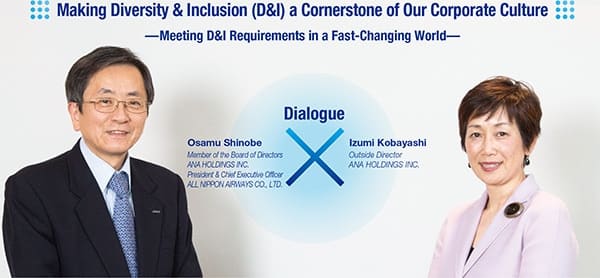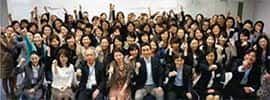Promoting Diversity and Inclusion
As the fiscal year ending March 2016 kicked off, the ANA Group formulated the ANA Group Diversity & Inclusion Declaration. To date, the ANA Group has produced many accomplishments through Diversity & Inclusion (D&I) initiatives such as promoting the employment of people with disabilities and women's success in the workplace. However, as globalization advances rapidly, D&I are becoming increasingly crucial. With this declaration as a starting point, we will encourage all of our employees to understand the significance of and actively engage in D&I. In doing so, we seek to shape an ANA Group that is able to generate new value by respecting the diversity of organizations and groups and by harnessing the differences between individuals as a source of strength.
ANA Group Diversity&Inclusion Declaration
We will:
- Respect the diversity of employees based on the belief that D&I will serve as a new source of value creation (innovation).
- Strive to create workplaces that maximize the strengths of individuals, where every individual is able to fully demonstrate his or her strengths.
- Create an ANA Group that enjoys unwavering trust and generates constant innovation by enabling everyone to work energetically and positively.
Dialogue

Mr. Shinobe: What must a company accomplish to survive in today's fast-changing world? Charles Darwin's Theory of Evolution offers some insight into this question:“It is not the strongest of the species that survive, nor the most intelligent that survives. It is the one that is most adaptable to change.” This principle tells us that there are two ways to ensure a company's survival:(1) Adapt the thinking and behavior of the company's current employees in line with the environment; and/or (2) Recruit employees who are able to successfully adapt to the changing environment. In essence, a company is able to promptly adapt to its environment when it has a diverse and inclusive workforce that reflects a variety of backgrounds.
Ms. Kobayashi: Looking at the ANA Group, the first major change in the environment that comes to mind is globalization. While expanding the share of its international flights, it must recruit more local personnel who are able to deal with differences not only in language but also in customs. This means that the ANA Group must step up recruitment of local personnel who are already familiar with their countries' customs and do not require any additional training in this respect.
Mr. Shinobe: It is difficult to skillfully negotiate multiple languages and cultures in situations where you only have Japanese people to do so. That is why ANA is now expanding its recruitment activities for cabin crews to Hong Kong, Shanghai, Bangkok and other locations.
— Finding a Place for Every Employee to Reach their Full Potential —
Mr. Shinobe: I believe that we must now pay closer attention to how we gauge individual talent. For example, the main thrust of personnel assignments should be to find a place for each employee to reach their full potential. We should not merely increase the number of women in a workplace because we think it has too few female employees.
Ms. Kobayashi: D&I at Japanese companies often ends up as a discussion about how many female officers should be appointed to management. However, I sense that you are looking at D&I from the deeper standpoint of ensuring corporate sustainability.
Mr. Shinobe: Ideally, D&I should be considered from the perspective of sustainability. However, the reality is that we still have a long way to go. To illustrate, there may be many employees who still believe that it is easier to get work done in an organization with a homogeneous workforce. In this day and age, however, companies that do not embrace D&I will clearly be left behind.
— Imperatives for Reshaping Employee Awareness —
Mr. Shinobe: From a very young age, we have been taught to believe that “there is only one correct answer” to test questions and other situations. I feel that this notion discourages us from thinking flexibly.
Ms. Kobayashi: In the real world, sometimes there are no correct answers at all; other times there is more than one correct answer. There are even situations where every option is correct. Because the ANA Group gives the highest priority to safety, manuals must be followed to the letter. That being said, employees should not take the approach of blindly doing only what is specified in the manual, or not doing something unless the manual says so. I believe that it is crucial for every individual to determine what he or she is able to accomplish, and act accordingly.
Mr. Shinobe: I couldn't agree more. It is imperative that we develop frameworks and programs that encourage people to give each other credit where credit is due, particularly for doing a good job. It is also vital for us to build human relationships as a foundation for all that we do. Ultimately, this will help us to jettison the notion that “there is only one correct answer.” We need to positively affirm our differences in thinking, personality, and ability, and ensure that every individual involved in the ANA Group can perform to their fullest. Provided that this principle is shared as a common goal, individuals should be free to determine how they go about getting their work done. The entire management team, including myself, is committed to executing management that embraces D&I—one that makes the most of each person's talent, character, and individuality.
Promoting Women's Success through Positive Action*

The ANA Group considers itself a group that truly utilizes diversity and encourages frank discussion and mutual enhancement regardless of race, age, gender, assignment, role, values or any other differences, and one that aims for a corporate culture that will empower the entire group. The ANA Group has announced its support for the aim of the Positive Action Promotion created by the Ministry of Health, Labour and Welfare, as well as set its own numerical targets (To increage the propotion of women in management positions up to 15% by the end of March 2020) for promoting women's success.
Moreover, the ANA-Women's Innovative Network for Diversity (ANAWINDS), a network of the ANA Group's female managers, was set up to help transform the mindset of women across group companies and departments.
- * Positive Action refers to voluntary and proactive measures undertaken by companies to eliminate disparities that have effectively arisen between male and female workers due to entrenched notions regarding gender-based roles and related precedents.
ANA Clinches 3rd Place Overall in the Nikkei Woman's Ranking of the “Best 100 Companies for Women to Work for in Japan”

At ANA, where female employees represent 55% of all employees, women already fulfill crucial roles and serve as a major competitive force that underpins quality in many worksites. However, as the airline industry experiences increasingly fierce competition, promoting women's success will be vital to rising above the next stage of competition, which will require the group to harness diversity as a strength. Therefore, the ANA Group will continue to advance career development support and reform working methods as part of efforts to develop an environment and culture where it is easy for women to form the core of the organization.
Promoting Work-Life Balance
In promoting diversity, the ANA Group believes it is essential to create an environment in which employees can fully demonstrate their abilities and work with enthusiasm. The Group's Motivation Promotion Office places importance on individual lifestyles and values to promote work-life balance that creates synergies for the Group as a whole. In addition to promoting changes to the way employees work, the ANA Group is fostering a corporate culture and environment that enables all employees to fully demonstrate their abilities. Some of the efforts include:
Systems
- Leave system to accompany a spouse posted overseas
- Re-employment of retired workers
- Work location change due to the transfer of spouse (between Tokyo and Osaka only)
- Leave system (Waku Waku Leave System) for study abroad or volunteer work
- Increasing the number of employees who are eligible for telecommuting (working from home)
- Area-based career-track system (Tokyo area only)
Fostering a Supportive Corporate Culture
- Holding diversity lectures
- Holding career design seminars for female employees
- Participating in the Ikuboss Alliance
- Holding Ikuboss seminars
- Participating in the “Father's Day Off” project
Work-Life Balance Support Systems
ANA offers a wide range of work-life balance support systems to support employees with childcare and nursing care responsibilities.
We provide support via the Work-Life Balance Support Website, etc. to make it easier for employees to understand and utilize the systems.
| Work-Life Balance Support Measures | |||
|---|---|---|---|
| Key work-life balance support systems |
|
|
|
| Fostering a corporate culture to promote work-life balance |
|
|
|
Usage of Childcare Support Systems (ANA)
| 2011 | 2012 | 2013 | 2014 | ||
|---|---|---|---|---|---|
| Number of employees who took childcare leave | Female | 409 | 447 | 466 | 590 |
| Male | 3 | 4 | 4 | 5 | |
Initiative Example
The ANA Group sees D&I and a sound work-life balance as sources of corporate competitiveness. Accordingly, we are advancing a variety of initiatives to achieve these priorities.

The ANA Group is a founding member of the Ikuboss Alliance, a corporate network that aims to develop supervisors (“Ikubosses”) who are able to support the careers and personal lives of subordinates and staff with whom they work based on work-life balance considerations, while ensuring that their organizations produce the best possible results. At the same time, Ikubosses are able to enjoy both their own professional and private lives.

The ANA Group participates in the “Father's Day Off” project involving both companies and NPOs. Based on the theme of “first birthdays,” this project seeks to celebrate a child's first birthday by having the father take that day off, as well as marks a heartfelt celebration of the parents' first year as mother and father.